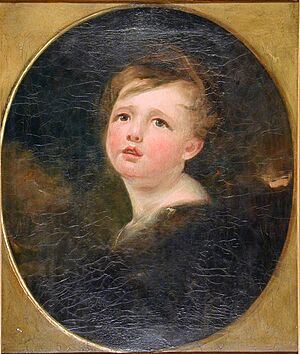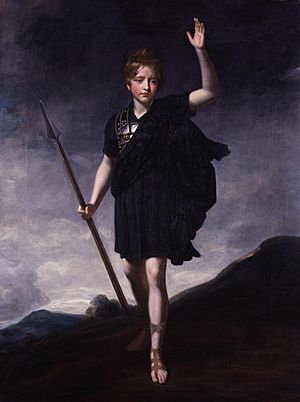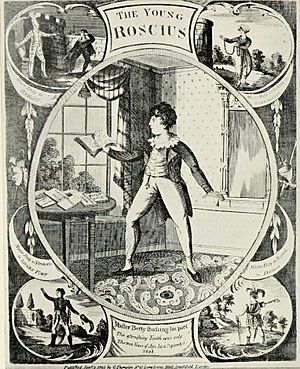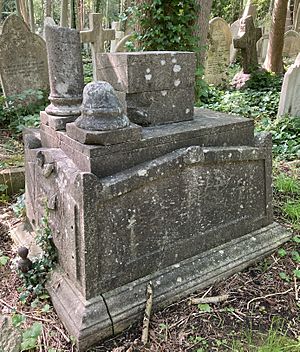Master Betty facts for kids
William Henry West Betty (born September 13, 1791, in Shrewsbury and died August 24, 1874, in London) was a very famous child actor in the early 1800s. People often called him "the Young Roscius," which was a compliment meaning he was as talented as a famous Roman actor.
Family Background
William's parents were quite wealthy because they inherited a lot of money. His mother received money from Shropshire, and his father, William Henry Betty, inherited from his family in the north of Ireland.
It's said that William's father spent his money quickly and lost much of it. This might have been one reason why young William started acting at such a young age.
William's own son, Henry Betty, also became an actor. He performed in Spalding theatre in October 1839.
Acting Career
William Betty first showed he wanted to be an actor when he was just eleven years old. In 1802, his father took him to Belfast to see a play called Pizarro. The famous actress Sarah Siddons was in it. William was so amazed by her acting that he said, "I shall certainly die if I may not be a player."
After this, William's father introduced him to Michael Atkins, who managed the Belfast Theatre. Atkins was very impressed by William. He said he had seen "an infant Garrick in Betty," comparing him to the legendary actor David Garrick.
Soon, William began training with Thomas Hough, a theatre director. He learned the role of Osman in Voltaire's play Zair. However, a rebellion in Ireland caused the Belfast theatre to close. Atkins needed a big draw to bring people back. He thought of William.
On August 11, 1803, eleven-year-old William Henry West Betty made his first professional appearance as Osman. A huge crowd came to see him. Reports said his performance was perfect and everyone loved it.
Next, he played Young Norval in John Home's play Douglas. This role was a better fit because he was playing a child. Again, he amazed the audience. News of "Master Betty" quickly spread across Europe.
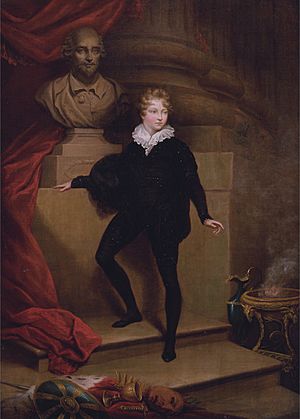
Master Betty's fame grew beyond Belfast to Dublin. His father arranged for him to perform at the Theatre Royal. He debuted there on November 28, 1803, again playing Young Norval in Douglas. He also performed in other plays like Lovers' Vows, Tancred, and even William Shakespeare's Hamlet. It was said he learned the entire part of Hamlet in just three hours! The people of Dublin were so excited that the city allowed theatre-goers to stay out an hour later than usual.
In 1804, his parents took him on a tour of Scotland and England. He received huge applause everywhere he went, especially when he played Young Norval again. His shows sold out and earned a lot of money. The author of Douglas, John Home, watched Betty perform and said it was the only time Young Norval was played exactly as he had imagined the character. After becoming a huge sensation in Dublin and Belfast, Master Betty was ready for London.
On December 1, 1804, guards were hired to control the excited crowds at the Covent Garden Theatre in London. People waited for hours to see the child star. When the doors opened, people rushed in, causing a big commotion.
Master Betty played Selim in Barbarossa or the Freedom of Algiers. He didn't appear on stage until halfway through the show, but the audience, including the Prince of Wales, gave him a grand welcome. The next night, there was a small riot, and some audience members were hurt. At another theatre, Drury Lane, the house was also packed. He earned an amazing salary of over 75 guineas a night, which was unheard of at the time.
Betty was also very popular in society. King George III himself introduced Betty to the queen. And William Pitt, a famous politician, once stopped a meeting of the House of Commons so that members could go see Betty perform!
Retirement and Later Attempts
Theatre owners in smaller towns sometimes raised ticket prices to cover the high fees paid to famous actors like Betty. This caused some discussion.
In 1807, Master Betty earned £182. 18s. 6d. for three nights in Boston, which was half of the total ticket sales. In Stamford, he received a huge £800 for five weeks.
Betty decided to leave the stage in 1808 to attend Christ's College in Cambridge. After he graduated, he lived with his family in the countryside. He was financially secure, meaning he had enough money saved.
In 1812, he was invited back to Covent Garden. He tried to perform as an adult, but critics mostly talked about his past as a child actor instead of his current performance. He was 21 at the time.
Betty never performed in London again after that. Nine years later, he tried another comeback but it also didn't work out. He finally stopped acting in 1824. His old acting tutor, Thomas Hough, had passed away a few years earlier.
William Betty spent the rest of his life working for charities, especially those related to theatre. He died on August 24, 1874, in Ampthill Square, London. He is buried with his wife and son in Highgate Cemetery. His grave has a unique design that he created himself.
Legacy
In 1990, a play about him called Master Betty by Carl Miller was reviewed in The Stage newspaper.
In 2022, a novel called The Young Pretender by Michael Arditti was published. It tells a story set during Betty's attempted comeback in 1812 and was well-received.
 | John T. Biggers |
 | Thomas Blackshear |
 | Mark Bradford |
 | Beverly Buchanan |


